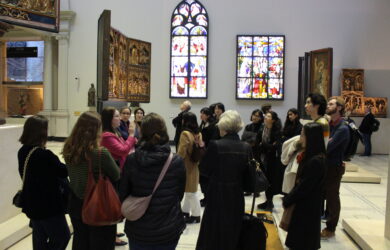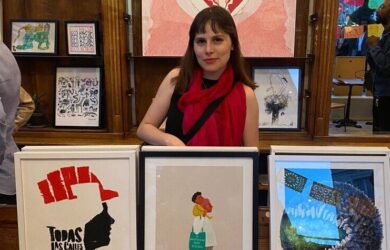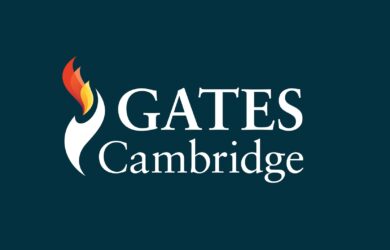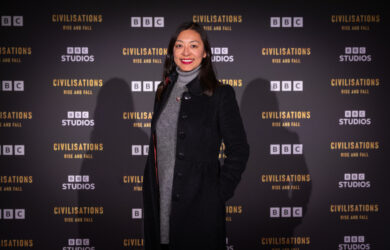
Noah Isserman talks about the development of his ideas about radical student- and researcher-led innovation.
The bulk of my work involves unlikely or counterintuitive partnerships and bringing people together. It’s about fascinating, purposeful puzzles.
Noah Isserman
When Noah Isserman was born his late father, an urban planning professor, wrote a paper in which he said: “We must be concerned with what is humanly possible, not just politically and economically possible.”
Years later Noah included the quote in his PhD dissertation at Cambridge. An ambition to make a difference is at the centre of that quote and is the heartbeat of Gates Cambridge whose focus on innovative, purposeful, student-led thinking has been one of the engines of Noah’s career in social enterprise.
Not only has Noah founded, led or collaborated on several multi-million dollar initiatives around student enterprise and innovation in his role as Assistant Professor of Business Administration and Social Work at the University of Illinois, but for his PhD he interviewed hundreds of CEOs and leaders to investigate the role of venture philanthropy in driving new ideas in the third sector.
At Cambridge, he also met many like-minded individuals who remain close friends and was able to present his research to the late Bill Gates Sr, who was the driving force behind Gates Cambridge.
He says: “Bill Sr. was a deep, real inspiration to me. He was an extraordinary man of extraordinary accomplishment. He also had extraordinary curiosity about others, and believed to his core that all lives have equal value. I heard him say it dozens of times.”
He says the Gates Cambridge model “has become a core element in my work – that sense of a welcoming, purposeful community which is radically student- and researcher-focused”.
For Noah social innovation is about bringing together the right people in the right environment. He is, he says, fascinated by the interplay between the individual and purposeful communities or teams and the seeds for that fascination can be seen in his childhood.
Childhood
Noah spent most of his early childhood in Morgantown, West Virginia, a couple of years in Berkeley, California, and attended high school in Illinois.
There he was not just interested in a broad range of academic subjects, but also got his first taste of teamwork. Noah captained his school’s soccer team, which went on to win a regional championship, and was editor in chief of his award-winning school newspaper. He was also runner-up for US High School Journalist of the Year and he says being interested in and telling stories about other people’s lives was a key part of his school experience. For him storytelling is a vital element of innovation, given startups need a clear narrative – a reason for why they are doing something and how they will do it – to be successful.
It was while he was at high school that Noah got a glimpse into the business world after securing a part-time job writing a manual for a video game. He also learned about the world of work through helping out at his mother’s dermatology clinic.
Noah’s high school, the University of Illinois Laboratory, was a selective university-model school. That meant Noah was able to do a number of university courses while still at school, which prepared him well for university life.
Amherst College
His broad interests meant he fitted in well at Amherst College where he initially intended to do a triple major in economics, psychology and law jurisprudence. In the end, though, he designed his own major, cognitive neuroscience, around his interest in the factors that influence human decision-making. It brought together philosophy, neuroscience and evolutionary biology. Having blazed that multi-disciplinary path, other students have since followed in his footsteps. Alongside his course and keen to investigate “different ways of arriving at what truth is”, Noah also studied political science .
During his time at Amherst, Noah [2008] played on the university soccer team and was active in student politics, rising to the post of Vice President of the student body and head of the Senate.
Ever the entrepreneur, he also co-founded a shipping and storage logistics company called MAStorage. The company, which went on to have a six-figure a year turnover and expand to four other universities, caters to students who need to leave their belongings in storage over the summer or if they are spending time abroad as part of their course.
It came about after an older friend of Noah’s piloted the idea. Noah got together three of his friends to take it to another level. “It was a phenomenal learning experience to start with a promising seed and build a team, build a culture and expand aggressively. Frankly, it was more successful than we expected,” says Noah, who had a 51% share in the business.
Built on friendship, the company was able to set its own rules: it hired other students at three times the minimum wage and provided them with free pizza and chicken wings. The company was also able to have a wider social impact, helping people affected by Hurricane Katrina and collecting textbooks for the University of Baghdad. The MAStorage team also waived their fee for students who didn’t have the resources to pay. When he graduated Noah and his friends sold the company on, although not to the highest bidder because they wanted to ensure that their founding principle of being led by students was maintained.
On the road to Cambridge
When he left university, Noah got a job with Common Ground Consulting, a strategy consultancy which works with the boards and leaders of non-profits and international development groups. Noah was the only full-time person at the company and worked in a client-facing role with the President which gave him a ring-side view of how leaders approach strategic issues.
Noah did some travelling after graduating and, while in the UK, had contacted academics in the Geography department at the University of Cambridge. “It felt like a special intellectual community where people studied anything that mattered, whether in real or metaphorical space,” says Noah. He was also drawn to Gates Cambridge’s values and sense of community.
He applied to do an MPhil followed by a PhD in Geography with a focus on impact investment and how money and talent can be allocated to improve the world. Noah had studied similar concepts, measuring individual brain activity and hormone levels, as an undergraduate, but at Cambridge he focused on third sector organisations and in particular on venture philanthropy.
His PhD, which was supervised by Dr Mia Gray, was influenced by his collaboration with Craig Dearden Phillips, CEO of Speaking Up [now VoiceAbility], a social business which was funded by venture philanthropists Impetus Trust and Breakthrough. At the time venture philanthropy was spreading very rapidly across Europe. “It was a new field and a really exciting topic to study and try to understand,” says Noah.
Spurred on by an interest in “the glorious messiness of real life”, Noah investigated how and whether a model based on venture capitalism for third sector organisations supporting early childhood, care and education could work. He interviewed around 200 leaders and CEOs of organisations as well as high level funders and government ministers. He focused in particular on three funds in Edinburgh, London and Germany and spoke to their founders.
He observed how funders formed communities of charities and gave them the time, space and resources to develop. “I was very surprised at the extent to which this model worked for a broad range of organisations and how that success correlated with two-way trust and collaborations between funders and organisations,” says Noah. “They had clear targets, secure funding over a long period of time and were in charge of how they evolved, with oversight by the venture philanthropists who took the role of a critical friend. It is a very different model to traditional philanthropy. Trust is at a premium, while the power differentials are decreased and the outcomes are better.”
Noah’s doctoral dissertation was recognised with the Rudney Memorial Award for Outstanding Dissertation in Nonprofit and Voluntary Action Research by ARNOVA, the primary research association for the nonprofit sector. The award committee stated the work was “particularly important in that it takes a holistic perspective that draws in the voices and experiences of recipients of venture philanthropy” and was “an important contribution to the field”.
In addition to his studies, Noah also continued to do consultancy work with his previous company and independently, working, for instance, in Kosovo, creating a youth leadership academy. There he was able to put what he was studying into action. The academy took young people from six ethnic groups and got them to work together to create social initiatives.
During his time at Cambridge Noah also immersed himself in the Gates Cambridge community, working on the professional development programme and making close friends who he is still in regular contact with. He has also gone on to both serve on the boards of startups founded by Gates Cambridge Scholars and to direct his students to Gates Cambridge Alumni mentors.
Assistant professorship
While he was studying for his PhD, Noah’s father died and he had to return to help his mother. He also took over leadership of and then sold an economic data company, WholeData LLC, which his father had founded with Noah’s assistance. In 2014, he was appointed Assistant Professor of Business Administration and Social Work at the University of Illinois at Urbana-Champaign. He taught social entrepreneurship.
He quickly hired Ryan Singh, a star student who, through Noah’s course, had founded a successful small charity doing mentorship-through-rap. His story is illustrative of Noah’s belief in student-centred learning and in how students and lecturers can learn together. Not only did he hire Ryan, but Ryan ended up becoming the youngest Associate Director in the entire university. Ryan has since gone on to found a startup which has managed to raise $2.3 million from an all-star group of investors and has tens of thousands of patients in India benefiting from their unlimited-primary-care, tech-enabled health insurance. Noah was their first investor.
After identifying a gap for student changemakers, Noah founded the campus-wide iVenture Accelerator initiative in 2015 which he describes as “the most generous, non-equity taking student entrepreneurship programme of its kind anywhere”. He says: “The accelerator we’ve created has already changed lives and won national awards for innovation. But we’re also generating deep data on what our student entrepreneurs are actually learning as they build. The data’s inspired or informed hundreds of changes to the accelerator. And we’re now starting to share this longitudinal data in new research, helping understand how and why people – and startups – thrive or struggle at the earliest stages. We hope it will help educators and governments and startup programmes and investors develop people and startups that succeed.”
Since its inception, the programme’s 240 student entrepreneurs and 79 ventures have raised $30 million and taken on 80 full-time employees between them. A quarter of the start-ups are non-profits and more than half are social ventures in areas like education and healthcare, for instance, a company that supplies solar power to disadvantaged communities. “We take students profoundly seriously in their ability to change the world. That is at the centre of what we do,” says Noah. “In so doing, I have tried to emulate the blend of purposefulness and community vibes of the Gates Cambridge community in a different context.”
The Accelerator also puts students in touch with successful serial entrepreneurs who are keen to help the next generation of startups. Noah states: “Our students are just one step away from first class advice.”
While at the University of Illinois, Noah’s entrepreneurial spirit has had free rein and he has been involved with a wide range of programmes, including the Origin Ventures Academy for Entrepreneurial Leadership and Social Innovation at Illinois, both of which he directed. Other projects include:
- the conceptualisation and design of the $48m interdisciplinary Siebel Center for Design, one of the biggest student-focused design centres in the world. Noah was on the core working group for the centre which opens this year.
- Chicago’s Discover Partners Institute, which is led by the University of Illinois and aims to promote new discoveries. Noah was involved at the ideas stage, working with senior leaders to craft the story and soul of the now $1 billion+ initiative.
- Illinois Automated and Connected Track. Noah was again involved at the ideas stage to craft the story and soul of this future-technology testing arena which aims to revitalise a rural community and shuttered US Air Force Base.
In addition, since 2006, Noah is founder and president of Global Partnerships & Strategy (GPS) Advisory, a consultancy group which helps to coordinate big, value-driven projects with a social purpose at their centre.
Noah states: “The bulk of my work involves unlikely or counterintuitive partnerships and bringing people together. It’s about fascinating, purposeful puzzles.” He cites architect Daniel Burnham’s quote, also a favourite of his father’s who introduced him to Burnham’s work: “Make no little plans; they have no magic to stir men’s blood… remember that our sons and our grandsons are going to do things that would stagger us.”
Noah reflects: “I love Burnham’s focus on ambition, but ambition grounded in the knowledge that we are links in a chain. We as individuals are not the point of our ambitions, nor the endpoint.”
*Photo credit: Joseph Abe-Bell












